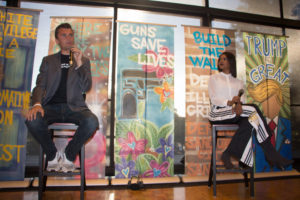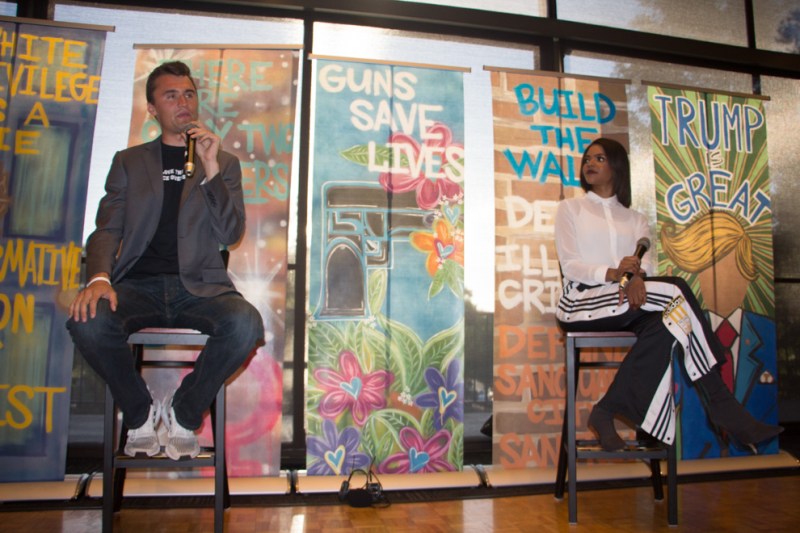On Tuesday, Stanford College Republicans (SCR) hosted Turning Point USA founder Charlie Kirk and director of urban engagement Candace Owens for its “Make Stanford Great Again” event. The lecture and question-and-answer session revolved largely around the stances listed on the event description:
“Trump is great. Build the wall. Deport criminal illegals. Guns save lives. There are only 2 genders. Abortion is murder. Defund sanctuary city San Francisco. Taxation is theft. Affirmative action is racist. White privilege is a lie.”

In a brief introduction, SCR president John Rice-Cameron ’20 praised the club’s work this school year, noting that, “after a year of almost complete inactivity last year,” the organization grew from 12 to 65 members. After asking SCR members in the audience to raise their hands, Kirk praised the group’s diversity, saying “I feel like it’s the United Nations.”
Although there were a small number of protesters inviting attendees to join them in a discussion outside the event, the well-secured event went smoothly, and the speakers made no mention of disruption. Further, the controversy over the naming of Stanford Professor David Palumbo-Liu to the TPUSA Professor Watchlist only came up briefly in response to a student question.
Kirk branded himself and Owens as “free thinkers,” beginning their discussion by denouncing claims of institutional racism in America. Owens said she holds the “simple idea” that people should not be held back because of the color of their skin, but she stressed that being black does not mean she has to be a Democrat.
“The thing about Candace Owens is she is a rule breaker,” Kirk said. “She is not supposed to exist. You see, the left, they have rules for how black people are supposed to vote and are supposed to think.”
Owens asked whether any audience members considered America more racist today than in the 1940s. When only one audience member raised their hand, Kirk said the response to the question was better than usual.
“My grandfather was picking cotton on a sharecropping farm,” Owens said. “He was branded in the face by the KKK for selling oranges on the wrong corner… it offends black history if I sit here and pretend I am more oppressed today than my grandfather was.”
The speakers also touched on police brutality and the Black Lives Matter movement.
Owens blamed the media and Black Lives Matter, which she and Kirk called a political tool used by Democrats to mislead Americans into believing institutional police brutality exists.
“I would never deny a horrific event,” Owens said. “What I will deny is your right to manipulate my emotions because a horrific event happened, to be able to control how I vote and how I view the world because a horrific event happened.”
Owens compared police deaths to deaths from doctor’s errors. She said that she doesn’t understand why people boycott police but not doctors.
“It’s foolish to boycott people who save our lives,” Owens said.
Kirk pointed out that many Black Lives Matter protests take place in cities with Democratic city councils, mayors and congress members. He argued Democrats allow cities to deteriorate because they feel that they don’t need to earn the black vote through effective policy—instead, Kirk claimed Democrats can simply call Republicans racists.
“The left, [infects and destroys] basically everything they touch, and they have touched our urban cities over the last 60-70 years,” Kirk said. “Those are the places with the highest crime, the most widespread poverty, the highest unemployment, failing schools.”
Both speakers also agreed in their praise of President Donald Trump. Kirk also praised the leadership of women in President Donald Trump’s administration, naming Press Secretary Sarah Huckabee Sanders and U.N. Ambassador Nikki Haley as examples of leaders.
“Donald Trump will go down as the greatest president of our lifetimes,” Kirk said.
During the question-and-answer session, the speakers urged dissenters to bring their questions forward, even allowing those with opposing views to cut in line. Questions from audience members revolved around topics including feminism, gender and climate change.
“I hate modern feminism,” Owens said, in response to a question. “Feminism today is a means to demonize men.” Kirk jumped in as well, arguing that the gender pay gap does not exist.
Another audience member asked what Owens and Kirk would say to someone who was questioning their gender identity, citing Owens’ earlier comment that identity should be celebrated. The speakers both said they sided “with science.”
“I don’t argue with science,” Owens said.
“Sex and gender are directly related,” Kirk added.
When the conversation shifted to climate change, however, the speakers said that they do not believe that anyone can prove that climate change is happening or that it is caused and controlled by human activity. Kirk said that a 99 percent consensus that climate change exists is not enough to convince him.
“So what about the one percent?” Kirk asked. “Science is not a democracy. We don’t vote on gravity. We don’t vote on Newton’s Second Law.”
Kirk added that people changed the term “global warming” to “climate change” in an attempt to convince more people of its reality, since they could not prove the earth is warming and climate is always changing. He and Owens likened this use of agreeable terminology to other initiatives such as Planned Parenthood and Black Lives Matter.
“That’s the thing about the left—they’re incredibly good when it comes to linguistics,” Owens said. “They use euphemisms.”
The event ended with Kirk imitating Trump, making hand gestures as the audience cheered and clapped.
“We are building a wall, and Mexico will pay for the wall,” Kirk said. “And with your help, we will make Stanford Great Again.”
Contact Holden Foreman at hs4man21 ‘at’ stanford.edu and Karen Kurosawa at karen16 ‘at’ stanford.edu.
